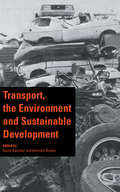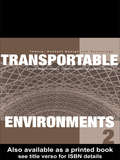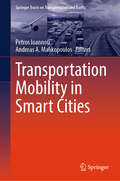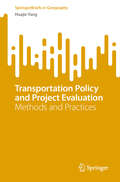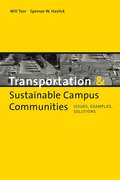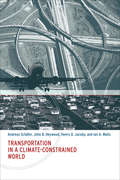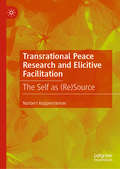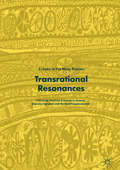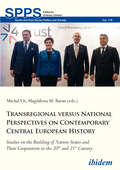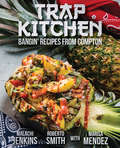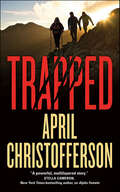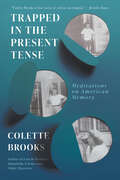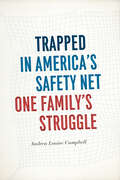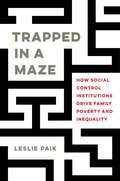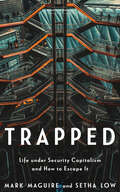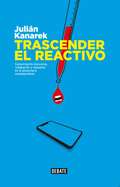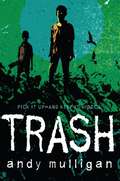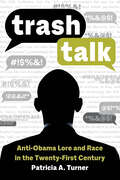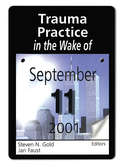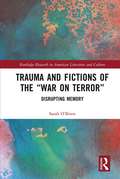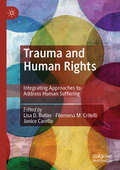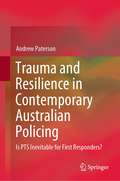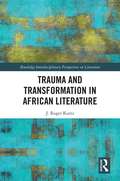- Table View
- List View
Transport, the Environment and Sustainable Development
by D. Banister K. ButtonThis book presents the current thinking from leading authorities worldwide on transport and the environment and focuses on the link between transport supply and use and environmental degradation.
Transportable Environments 2
by Robert Kronenburg Joseph Lim Wong Yunn ChiiThis book explores aspects of the historical and theoretical basis for temporary and transportable environments and provides an insight into the wide range of functions that they are used for today, the varied forms they take and the concerns and ideas for their future development. Themes in the book range from wide-ranging topical issues like the ecological implications of building to more focused investigations such as shelter after disaster. The book will be of interest to both students and practising architects, engineers and those involved in the creation of the built environment. It will also be of value to those involved in areas of product design, design history, building component manufacture and urban design.
Transportation & Land Use Innovations: When you can't pave your way out of congestion
by Reid EwingFirst published in 1997. Routledge is an imprint of Taylor & Francis, an informa company. This handbook introduces community leaders to an understanding of transportation mobility, offering suggestions to reduce congestion, automobile dependence, and vehicle miles of travel.
Transportation Mobility in Smart Cities (Springer Tracts on Transportation and Traffic #21)
by Petros Ioannou Andreas A. MalikopoulosThis book covers multiple dimensions of future mobility systems in smart cities, mapping out the innovations that are needed, presenting ideas on how to address the challenges they present and exploring a holistic research path for future developments. The book considers the interaction between: technological developments in modes of transport and transportation systems like autonomous systems and shared mobility that lead to emerging mobility systems; the social behavior of the drivers and travelers who interact with these systems; and the institutional behavior of organized units such as the administrators responsible for the policies involved with transportation governance and regulation. Transportation Mobility in Smart Cities provides methods to analyze, design, and optimize a mobility system, taking into consideration this constellation of social and institutional factors as well as the necessary technological requirements. The result is a mobility system that will be acceptable to travelers without imposing undue inequities in transportation on the smart city. The holistic approach taken in addressing the problems involved with establishing a mobility system within a smart city makes this book attractive to researchers and practitioners, technologists, and policy makers alike. Graduate students working in areas connected with the evolution of transportation systems will also find the material presented in this book instructive.
Transportation Policy and Project Evaluation: Methods and Practices (SpringerBriefs in Geography)
by Huajie YangThis book adopts a methodology-focused approach, concentrating on quantitative techniques for transportation. It specifically focuses on methods that have been or potentially could be applied to study the effects of transportation policies and projects. The prevailing research features three key research categories: cross-sectional regression models, simulation (forecasting) methods, and causal inference models.
Transportation and Sustainable Campus Communities: Issues, Examples, Solutions
by Spenser Havlick Will ToorColleges and universities across North America are facing difficult questions about automobile use and transportation. Lack of land for new parking lots and the desire to preserve air quality are but a few of the factors leading institutions toward a new vision based upon expanded transit access, better bicycle and pedestrian facilities, and incentives that encourage less driving. Transportation and Sustainable Campus Communities presents a comprehensive examination of techniques available to manage transportation in campus communities. Authors Will Toor and Spenser W. Havlick give readers the understanding they need to develop alternatives to single-occupancy vehicles, and sets forth a series of case studies that show how transportation demand management programs have worked in a variety of campus communities, ranging from small towns to large cities. The case studies in Transportation and Sustainable Campus Communities highlight what works and what doesn't, as well as describing the programmatic and financial aspects involved. No other book has surveyed the topic and produced viable options for reducing the parking, pollution, land use, and traffic problems that are created by an over-reliance on automobiles by students, faculty, and staff. Transportation and Sustainable Campus Communities is a unique source of information and ideas for anyone concerned with transportation planning and related issues.
Transportation in a Climate-Constrained World (The\mit Press Ser.)
by Andreas Schafer John B. Heywood Henry D. Jacoby Ian A. WaitzA discussion of the opportunities and challenges involved mitigating greenhouse gas emissions from passenger travel.In the nineteenth century, horse transportation consumed vast amounts of land for hay production, and the intense traffic and ankle-deep manure created miserable living conditions in urban centers. The introduction of the horseless carriage solved many of these problems but has created others. Today another revolution in transportation seems overdue. Transportation consumes two-thirds of the world's petroleum and has become the largest contributor to global environmental change. Most of this increase in scale can be attributed to the strong desire for personal mobility that comes with economic growth. InTransportation in a Climate-Constrained World, the authors present the first integrated assessment of the factors affecting greenhouse gas (GHG) emissions from passenger transportation. They examine such topics as past and future travel demand; the influence of personal and business choices on passenger travel's climate impact; technologies and alternative fuels that may become available to mitigate GHG emissions from passenger transport; and policies that would promote a more sustainable transportation system. And most important, taking into account all of these options are taken together, they consider how to achieve a sustainable transportation system in the next thirty to fifty years.
Transrational Peace Research and Elicitive Facilitation: The Self as (Re)Source
by Norbert KoppensteinerThis book sheds new light on transrational approaches to peace research and highlights elicitive approaches to facilitation. Rather than encouraging researchers, teachers and practitioners to control and suppress their own positionality, the book argues that they can see themselves as a potential (re)source that can be creatively tapped for their work. Using dance as a central metaphor, it seeks to reposition research and facilitation as a truly experiential process where the entirety of human experiences and epistemologies can be brought into interplay, opening up new sources of knowledge. Providing a cutting-edge theoretical framework and based on his practical experience, the author demonstrates that facilitation and research are not just cognitive, but can also be(come) embodied, emotional, intuitive, relational and spiritual. By proposing a systematic, methodological framework for research and facilitation, the book offers practical guidance for peace practitioners, facilitators and researchers interested in working through all dimensions of their being and engaging with conflict transformation in a holistic way.
Transrational Resonances: Echoes To The Many Peaces
by Josefina Echavarría Alvarez Daniela Ingruber Norbert KoppensteinerThis book comprehensively gathers the current academic literature, field expertise and artistic developments on Wolfgang Dietrich’s Many Peaces theory, in the ways it has been conceptualized and practiced by peace and conflict workers around the world. Both scholars and practitioners challenge and creatively explore the field of transrational peace philosophy, contributing their insights on elicitive methods and conflict mapping. The book is further enriched by artistic perspectives on integrative approaches to theatre for living and intercultural soundscapes.The articles collected here respond with innovative strength and vigor to the worldwide need for further research on peace and for practical approaches to conflict transformation. This book therefore equally appeals to scholars, peacebuilders and practitioners as well as artists engaged in conflict transformation.
Transregional versus National Perspectives on Contemporary Central European History: Studies on the Building of Nation-States and Their Cooperation in the 20th and 21st Century (Soviet and Post-Soviet Politics and Society #170)
by Michal Vít Magdalena M. BaranThis volume compares different regional perspectives on the national and democracy-building aims of individual states. It confronts discourses about national states to regional perspectives on the past as well as the current political and social landscape. Why are we observing calls for national identity right now? What are the roots of this development? How can a Central European identity be shaped when national perspectives are prevalent?The book's first part analyzes social and political processes that shaped nation-states in the Central European region and shows divergent trends of individual states when it comes to defining a regional approach of the Visegrád Group (Poland, Czech Republic, Slovakia, Hungary = V4). The second part focuses on key personalities of the 20th century history of individual V4 countries in the light of their perception in the neighbouring states and how they shaped national states as well as identities after the end of World War II. Similar aims and approaches implemented by individual countries often led to anything but raising regional understanding. The book's third part reflects upon activities of various initiatives aiming to approach this challenge from the perspective of civil society, and Central Europe's young generation. The collection brings together leading historians of Central Europe from the V4 countries. It also offers external perspectives on historical developments in Central Europe from the perspective of the 21st century and on political cooperation as well as its roots. Lastly, it includes practitioners of Central European cooperation from both academia and civil society and their reflection on their countries' political cooperation after 1989.
Trap Kitchen (Trap Kitchen #1)
by Malachi Jenkins Roberto Smith Marisa Mendez"Jenkins and Smith, who once belonged to rival L.A. gangs, became friends and started a catering business marketed solely on Instagram. Media outlets took notice, as did Snoop Dogg and Martha Stewart, paving the way for their debut cookbook" – Publishers WeeklyWhen two former members of Los Angeles' most nefarious rival gangs decided to unite under one oven, they had no idea that they would be creating an empire. Trap Kitchen is more than just a cookbook. It's a glimpse into the meals that have now become famous in the LA streets thanks to the series of pop-up restaurants that continue to bloom throughout the area. Celebrities and residents alike flock to the locations for soulful meals, but it's more than that. Having lost friends and family to violence, we learn how the masterminds behind Trap Kitchen sought to change the paths they were on, using cooking as their driving force. While other cookbooks may boast a level of urban-skewed appeal in their realness, this cookbook also delves into the stories of why they became involved in cooking in the first place. It's both a heartfelt and stomach-filling experience to learn how two men changed their stars by seeking out peace and good food for themselves and their community.
Trapped
by April ChristoffersonYellowstone backcountry ranger Will McCarroll is every poacher and trapper's worst nightmare. His tireless defense of endangered wildlife has made him a national hero, but when Will's anger over legislation allowing loaded guns in national parks causes him to break the rules one time too many, he finds himself transferred from his beloved Yellowstone to Montana's Glacier National Park. In this edgy eco- and political-thriller, Will soon finds in Glacier a wilderness worth defending—and under siege from illegal trappers, a right-wing radio talk show hosting a predator derby, and members of a radical offshoot of the American Rifle Foundation.When Yellowstone Magistrate Judge Annie Peacock realizes Will has been lured into Glacier's backcountry as part of an ARF plot to silence him, she enlists the help of Johnny Yellow Kidney, Glacier National Park's wolverine biologist. Aided by locals from the Blackfeet reservation, Annie and Johnny's quest to warn Will ends up a race for time—one whose outcome will impact not only Will, but the lives of the two- and the four-leggeds he's sworn to protect as well.April Christofferson introduces us to Montana's wild and wonderful "Crown of the Continent" in Trapped.At the Publisher's request, this title is being sold without Digital Rights Management Software (DRM) applied.
Trapped In the Present Tense: Meditations on American Memory
by Colette BrooksFor readers of Rebecca Solnit and Jenny Odell, this poetic and inventive blend of history, memoir, and visual essay reflects on how we can resist the erasure of our collective memory in this American century.Our sense of our history requires us to recall the details of time, of experiences that help us find our place in the world together and encourage us in the search for our individual identities. When we lose sight of the past, our ability to see ourselves and to understand one another is diminished. In this book, Colette Brooks explores how some of the more forgotten aspects of recent American experiences explain our challenging and often puzzling present. Through intimate and meticulously researched retellings of individual stories of violence, misfortune, chaos, and persistence—from the first mass shooting in America from the tower at the University of Texas, the televised assassinations of John F. Kennedy and Lee Harvey Oswald, life with nuclear bombs and the Doomsday Clock, obsessive diarists and round-the-clock surveillance, to pandemics and COVID-19—Brooks is able to reframe our country&’s narratives with new insight to create a prismatic account of how efforts to reclaim the past can be redemptive, freeing us from the tyranny of the present moment.
Trapped in America's Safety Net: One Family's Struggle (Chicago Studies in American Politics)
by Andrea Louise CampbellA “remarkable” look at the flaws of the social safety net through one family’s personal tragedy and the Catch-22 financial disaster that followed (Deborah A. Stone, author of Policy Paradox).When Andrea Louise Campbell’s sister-in-law, Marcella Wagner, was run off the freeway by a hit-and-run driver, she was seven-and-a-half months pregnant. She survived—and, miraculously, the baby was born healthy. But that’s where the good news ends. Marcella was left paralyzed from the chest down. This accident was much more than just a physical and emotional tragedy. Like so many Americans, neither Marcella nor her husband, Dave, who worked for a small business, had health insurance. On the day of the accident, she was on her way to class for the nursing program through which she hoped to secure one of the few remaining jobs in the area with the promise of employer-provided insurance. Instead, the accident plunged the young family into the tangled web of means-tested social assistance.As a social policy scholar, Campbell thought she knew a lot about means-tested assistance programs. What she quickly learned was that missing from most government manuals and scholarly analyses was an understanding of how these programs actually affect the lives of the people who depend on them. Using Marcella and Dave’s situation as a case in point, she reveals the programs’ shortcomings in this book. Because American safety net programs are designed for the poor, the couple first had to spend down their assets and drop their income to near-poverty level before qualifying for help. What’s more, to remain eligible, they’ll have to stay under these strictures for the rest of their lives, barred from doing many of the things middle-class families are encouraged to do: Save for retirement. Build an emergency fund. Take advantage of tax-free college savings. And, while Marcella and Dave’s story is tragic, the financial precariousness they endured even before the accident is all too common in America, where the prevalence of low-income work and unequal access to education have generated vast—and growing—economic inequality. The implementation of the ACA has cut the number of uninsured and underinsured and reduced some disparities in coverage, but continues to leave too many people open to tremendous risk.Behind the statistics and beyond the ideological battles are human beings whose lives are stunted by policies that purport to help them. In showing how and why this happens, Trapped in America’s Safety Net offers a way to change it.“An engaging narrative account of how social assistance programs shape real people’s lives. Campbell is authoritative and scholarly, yet warm and personal—a rare combination one sees in the likes of Oliver Sacks and Barbara Ehrenreich.” —Deborah A. Stone, author of Policy Paradox“Makes a compelling case for a stronger, more integrated, and ultimately more effective strategy for helping the millions of Americans who find themselves plummeting out of the insecure middle class.” —Jacob S. Hacker, New York Times–bestselling coauthor of Winner-Take-All Politics
Trapped in a Maze: How Social Control Institutions Drive Family Poverty and Inequality
by Leslie PaikTrapped in a Maze provides a window into families' lived experiences in poverty by looking at their complex interactions with institutions such as welfare, hospitals, courts, housing, and schools. Families are more intertwined with institutions than ever as they struggle to maintain their eligibility for services and face the possibility that involvement with one institution could trigger other types of institutional oversight. Many poor families find themselves trapped in a multi-institutional maze, stuck in between several systems with no clear path to resolution. Tracing the complex and often unpredictable journeys of families in this maze, this book reveals how the formal rationality by which these institutions ostensibly operate undercuts what they can actually achieve. And worse, it demonstrates how involvement with multiple institutions can perpetuate the conditions of poverty that these families are fighting to escape.
Trapped: Life under Security Capitalism and How to Escape It
by Setha Low Mark MaguireExploring the pernicious influence of security capitalism on neighborhoods, airports, cities, and states. Calls to defund the police or to stop brutal police violence, argue Mark Maguire and Setha Low, will never succeed as long as there are those who enjoy and take comfort in security capitalism. Security capitalism can be recognized by the marks it leaves on society, remaking public space in its own image—privatized, fortified, unequal, striated, and access-controlled. With a global and comparative lens that takes readers from Nairobi to New York City, Maguire and Low offer intimate portraits of the people behind security capitalism—the police, policy makers, and private contractors who agree that a price must be paid in blood to maintain public safety—and critique phenomena like the transfer of public funds to arms dealers via the militarization of police, securitized housing developments, and ineffectual counterterrorism efforts. But more than just an exposé of the nefarious corporations, corrupt agencies, and incompetent governments, this book uniquely shines the spotlight on the ordinary citizens whose desires for safety drive these phenomena. Angela Davis has written of the challenge of persuading people that "safety, safeguarded by violence, is not really safety." Maguire and Low aid us in thinking through the challenge, providing a common language to discuss security capitalism and offering ways to escape its clutches.
Trapped: The Terrifying True Story of a Young Girl's Secret World of Abuse
by Rosie LewisLocked for nine years in a secret world of severe abuse, as Phoebe opens up about her horrific past, her foster carer begins to suspect that Phoebe may not be suffering from autism at all.
Trascender el reactivo: Concentración discursiva, indignación y respuesta en la democracia contemporánea
by Julián Kanarek¿Cómo salir de esta lógica de concentración discursiva? ¿Cómo trascender el reactivo y pensar en proyectos propios? ¿Qué lugar ocupa la utopía? La comunicación política es parte del problema y parte de la respuesta. Las democracias viven una época de redefinición y desafíos permanentes. A la polarización y la pérdida de confianza en las instituciones se suman las características de las redes sociales, que en un momento representaron esperanza, pero hoy configuran espacios de manipulación de información, posverdad, conversaciones tóxicas y agresivas que moldean la manera en la que hablamos y pensamos la política. La realidad de las democracias algorítmicas así como sus consecuencias tanto para el ejercicio del poder como de las oposiciones trae consigo una serie de personajes estridentes y polémicos que están dispuestos a correr la barrera de lo políticamente aceptable para una sociedad con tal de atraer la atención de usuarios, medios y el resto del sistema político.
Trash
by Andy MulliganIn an unnamed Third World country, in the not-so-distant future, three dumpsite boys make a living picking through the mountains of garbage on the outskirts of a large city. One unlucky-lucky day, Raphael finds something very special and very mysterious. So mysterious that he decides to keep it, even when the city police offer a handsome reward for its return. That decision brings with it terrifying consequences, and soon the dumpsite boys must use all of their cunning and courage to stay ahead of their pursuers. It's up to Raphael, Gardo, and Rat--boys who have no education, no parents, no homes, and no money--to solve the mystery and right a terrible wrong. Andy Mulligan has written a powerful story about unthinkable poverty--and the kind of hope and determination that can transcend it. With twists and turns, unrelenting action, and deep, raw emotion, Trash is a heart-pounding, breath-holding novel.
Trash Talk: Anti-Obama Lore and Race in the Twenty-First Century
by Patricia A. TurnerWhat racist rumors about Barack Obama tell us about the intractability of racism in American politics. Barack Obama and his family have been the objects of rumors, legends, and conspiracy theories unprecedented in US politics. Outbreaks of anti-Obama lore have occurred in every national election cycle since 2004 and continue to the present day—two elections after his presidency ended. In Trash Talk, folklorist Patricia A. Turner examines how these thought patterns have grown ever more vitriolic and persistent and what this means for American political culture. Through the lens of attacks on Obama, Trash Talk explores how racist tropes circulate and gain currency. As internet communications expand in reach, rumors and conspiracy theories have become powerful political tools, and new types of lore like the hoax and fake news have taken root. The mainstream press and political establishment dismissed anti-Obama mythology for years, registering concern only when it became difficult to deny how much power those who circulated it could command. Trash Talk demonstrates that the ascendancy of Barack Obama was never a signal of a postracial America.
Trauma Practice in the Wake of September 11, 2001
by Steven N Gold Jan FaustTrauma practitioners and educators: are you ready to meet the challenges of the aftermath of terrorist attacks?Trauma Practice in the Wake of September 11, 2001 will show you how frontline trauma practitioners responded to the crisis of the terrorist attacks. In keeping with Haworth’s mission to provide practitioners and educators with timely information on the assessment and treatment of trauma, this essential book responds to the traumatic impact of the events of September 11th, 2001 and their implications for trauma practice. In Trauma Practice in the Wake of September 11, 2001, you’ll hear from the leaders of the Green Cross--one of the most prominent organizations providing psychological disaster response services--on their experience in the World Trade Center disaster, and read about the treatment of a client who was in the first WTC bombing in 1993. You'll also find revealing interviews with an Israeli psychologist and a Palestinian psychiatrist who focus on the impact of terrorism on their citizens. Trauma Practice in the Wake of September 11, 2001 is your key to state-of-the-art information on: the psychology of terrorism the traumatic impact of terrorism on those directly affected the traumatic impact of terrorism on the general population ways to help children, adolescents, and adults cope with the aftermath of the terrorist attacks on America how to deal with “compassion fatigue” (emotional depletion among helping professionals working with traumatized populations) traumatologists’response to rescue workers and victims in New York CityThe catastrophic events of September 11th have and will continue to raise special challenges for those of us in the field of trauma practice. By publishing this book and the ones to follow, we hope to assist trauma practitioners and educators in effectively meeting these continuing challenges.
Trauma and Fictions of the "War on Terror": Disrupting Memory (Routledge Research in American Literature and Culture)
by Sarah O'BrienThis book explores the ways in which transnational fiction in the post-9/11 era can intervene in discourse surrounding the "war on terror" to advocate for marginalised perspectives. Trauma and Fictions of the "War on Terror" conceptualises global political discourse about the "war on terror" as incongruous, with transnational memory frames instituted in Western nations centralising 9/11 as uniquely traumatic, excluding the historical and present-day experiences of Afghans under Western—specifically American—hegemonic violence. Recent developments in trauma studies explain how dominant Western trauma theory participates in this exclusion, failing to account for the ongoing suffering common to non-Western, colonial, and postcolonial contexts. O’Brien explores how Khaled Hosseini (The Kite Runner), Nadeem Aslam (The Wasted Vigil, The Blind Man’s Garden), and Kamila Shamsie (Burnt Shadows) represent marginalised perspectives in the context of the "war on terror".
Trauma and Human Rights: Integrating Approaches to Address Human Suffering
by Lisa D. Butler Filomena M. Critelli Janice CarelloHuman rights violations and traumatic events often comingle in victims’ experiences; however, the human rights framework and trauma theory are rarely deployed together to illuminate such experiences. This edited volume explores the intersection of trauma and human rights by presenting the development and current status of each of these frameworks, examining traumatic experiences and human rights violations across a range of populations and describing efforts to remediate them. Individual chapters address these topics among Native Americans, African Americans, children, women, lesbian/gay/bisexual/transgender individuals, those with mental disabilities, refugees and asylees, and older adults, and also in the context of social policy and truth and reconciliation commissions. The authors demonstrate that the trauma and human rights frameworks each contribute invaluable and complementary insights, and that their integration can help us fully appreciate and address human suffering at both individual and collective levels.
Trauma and Resilience in Contemporary Australian Policing: Is PTS Inevitable for First Responders?
by Andrew PatersonThis book examines how fifty police officers in South Australia keep well and “bounce back” from duty-related traumatic experience in the absence of practical, accessible and timely organisational support. It investigates mechanisms police officers presently use to “normalise” their duty-related traumatic experiences to preserve the delicate professional balance between “coping” and “psychic numbing” and avoid the much publicised perils of a PTSD diagnosis, while being appropriately responsive to colleagues, victims and survivors in their daily work environment. By revealing how police officers manage trauma—outside of the expectations of mental health professionals, union representatives and police leadership—innovative approaches and recommendations are offered to support first responders in moving from assumptions of post-traumatic stress and through post-traumatic growth. The book considers recent advances in post-traumatic growth and resilience theory and reinterprets exposure in a positive context, as well as preventative experiences in Australia and internationally.
Trauma and Transformation in African Literature: Writing Wrongs (Routledge Interdisciplinary Perspectives on Literature)
by J. Roger KurtzThis book fills a gap in the field of contemporary trauma studies by interrogating the relevance of trauma for African literatures. Kurtz argues that a thoughtful application of trauma theory in relation to African literatures is in fact a productive exercise, and furthermore that the benefits of this exercise include not only what it can do for African literature, but also what it can do for trauma studies. He makes the case for understanding trauma healing within the larger project of peacebuilding, with an emphasis on the transformative potential of what he terms the African moral imagination as embodied in the creative work of its writers. He offers readings of selected works by Chinua Achebe, Ngugi wa Thiong’o, Chimamanda Adichie, and Nuruddin Farah as case studies for how African literature can influence our understanding of trauma and trauma healing. This will be a valuable volume for those with interests in current trends and developments in trauma studies, African literary studies, postcolonial studies, and memory studies.
